Jordan Bates • • 21 min read
Nietzsche’s Gymnastics of the Will: The Path From Hell to the Good Life
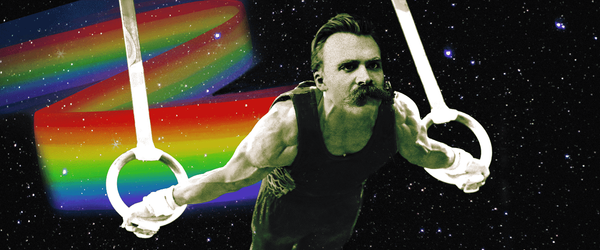
In 2018, temptation is everywhere.
Social media. TV. Alcohol. Drugs. Sex. Video games. Delicious shitty food. Consumer products. Porn. Sedentary lifestyles.
From all angles, we’re bombarded with advertisements and signals urging us to give in to our lower impulses…
“It’s okay. Everything is good. Who needs real goals and dreams? Who needs real health and physical vitality? Just let go. Sit back, be lazy, soak in this HD entertainment, chase that fleeting high, buy more shit you don’t need, lather, rinse, repeat.”

In moderation, most of the things I listed aren’t bad for us. Hell, it’s healthy to make space in life for leisure time and a little Dionysian intoxication.
But most of us aren’t good at moderating ourselves.
In fact, we’re bloody awful at it. We’re like those lab rats in the 1950s that chose to push a little lever thousands of times per hour to deliver pleasurable sensations to their brains, ignoring food, water, and their children in favor of pure hedonic bliss.
The problem, of course, is that endless hedonism tends to be a soul-crushing and hollow way to live. Many have observed that the pursuit of pleasure for pleasure’s sake is an unwinnable game—that genuine lasting joy tends to emerge only as a byproduct of non-hedonistic pursuits.
Yet we see the desolation of unfettered pleasure-seeking all around us, in the form of addictions.
World of Warcraft junkies putting in 18 hours per day. Morbidly obese people stuffing more Wendy’s into their faces. Facebook fiends scrolling, scrolling, scrolling, 8 hours per day, looking for that next hit of dopamine. Shopaholics whipping out the magic Visa wand for the 100th unnecessary purchase in a month. Cannabis abusers taking their 13th bong rip of the day, lost in a perpetual haze.
You think such people feel good about themselves at the end of the day? You think they go to bed fulfilled and excited about the wondrous possibilities they intend to explore in this world?
Hell no.
They’re lost, afraid, trapped, and on some level they know it. And it burns. Eats away at them, acid-like. Scalds the part of them that wanted something more.
So why do they keep doing it?
Because in the moment it feels good. Because they lack the strength and discipline to change. Because they’re suffering, running from something. From the fear of actually staring into their own souls and accepting what they find there. From the fear of gazing into the abyss of this life, seeing how little we truly know, seeing the immense suffering of this reality, and accepting it. Or better yet, affirming it. Saying “Yes!” to it and resolving to help improve this world.
The task seems overwhelming.
And in case you think “they” refers to some far-off group of losers who we can all just pity and chuckle at, I got news for you: you and I are not outside of this.
And you know it, on some level. Reading this right now, you’ve thought about your own toxic habits and borderline addictions. How you feel like you’re wasting too much time watching Netflix and scrolling Instagram, how you need to get back to the gym and stop watching so many Sasha Grey videos. How you need to resuscitate that dying passion project. Some version of that.
I know you, human. And I love you. Because I’m in the same pirate ship. Over the years I’ve had my struggles. Alcohol, weed, video games, Internet black holes, overeating. Oh yeah, I’m far from immune.
We’re all caught up in this game, working every day to find a way out of the hell of soulless hedonism into the light of a more meaningful, noble, purpose-driven existence.
And the stakes are high. Lethally high.
If I’m lucky, I might have some worthwhile advice to offer you—to help you navigate this game more expertly, to kickstart your progress toward a life you actually want to live.
You see, despite having fought my fair share of personal battles, I’ve managed to come quite a long way on this path.
I know this because I wake up almost every day excited to exist. I can’t remember the last time I felt bored. I look to the future and hope to live for thousands of years because there’s so damn much I want to create and experience in this universe. I regularly say “no” to impulsive hedonism in favor of practicing the good long-term habits that I know are the bedrock of a beautiful sojourn on this Earth.
How did I reach this point? What’s the secret?
Unfortunately I won’t be telling you about a little-known pill or bliss smoothie—just $19.95!—that you can take once and make all your problems disappear.
Nope, what I’m going to share with you today is a lot less sexy, but a lot more real.
The answer is this: Discipline. Strength. Habit-formation. The cultivation of willpower through something the great philosopher Friedrich Nietzsche called a “gymnastics of the will.”
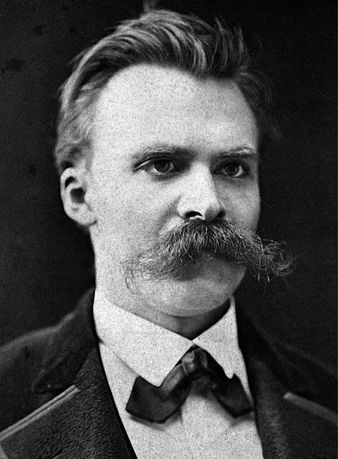
What I’m about to tell you has the power to revitalize your existence. I swear to Nature I wouldn’t be writing these words if I didn’t believe that.
So sit back, grab a tall glass of water, and toss your assumptions in the dumpster. The assumption dumpster. The, uh, Assumpster, heh heh.
Let me show you how to exit Hades and discover a world that doesn’t suck.
Habits: The Unsexy Building Blocks of the Good Life
The first thing to understand—the fundamental message that I will repeat throughout this essay—is that habits are the answer.
Habits aren’t flashy. They’re not sexy. They’re not shiny. They’re not quick fixes.
And so most people overlook them, in search of a more convenient or luxurious solution to their problems.
But in truth, your habits—the patterns of thought and action you play out every damn day—are what your life is made of.
Life’s calculus forgets nothing. It is perhaps impossible to live a fulfilling life if you’re not spending most of your time thinking and acting in noble, useful, vitalizing, and/or wholesomely enjoyable ways. Doing things that are, in the most basic sense, healthy for you. Every day, or close to it.
This message is deceptively simple. It seems like common sense. And yet it’s astonishing how many people ignore the wisdom of this approach to life, allowing toxic habits to solidify into addictions and never really giving good habits a chance to take root. As MF DOOM put it:
“‘I can stop anytime I want to’—
Famous last words that came back to haunt you”
Or Warren Buffett:
“The chains of habit are too light to be felt until they are too heavy to be broken.”
We underestimate the power of habit, assuming we can change our core habits at any time if we really want to. And to an extent this is probably true: It’s almost always possible to change your core habits.
But this attitude overlooks something absolutely pivotal: As time passes, habits become entrenched and exponentially more difficult to change. Thus the folk proverb, “You can’t teach an old dog new tricks.”
It’s best to get in as early as possible and start shaping your fundamental habits into the ones which will serve you well for decades to come. If you don’t, you may wake up one day and realize you no longer have the will to reverse years of southbound momentum.
“But how do you go about changing your habits? And how do you determine which habits will actually serve you well for the long-term?”
The best answer I’ve found is that you undertake experiments of willpower. You deliberately stretch yourself. You set firm intentions to try on new habits for periods of time, or to practice abstaining from behaviors you think may be destructive long-term. In short, once more, you undertake what Nietzsche called a “gymnastics of the will.”
Now, let’s take a deep dive into Nietzsche’s gymnastics of the will to understand what exactly it is, what exactly it is not, and how you can use it to live a life worth living.
Nietzsche’s Gymnastics of the Will: The Path to Self-Mastery
“From life’s school of war: what does not kill me, makes me stronger.”
— Friedrich Nietzsche
Our story now turns to one of the most incomparable individuals who ever walked this Earth: Friedrich Wilhelm Nietzsche.
Let’s get something out of the way: I love this fucking guy. My website’s logo is an image of Nietzsche wearing a pair of headphones, for Buddha’s sake. I printed a thousand stickers displaying my ‘Audiophile Nietzsche’ logo and have been sticking them up all over Europe and the United States for the past year and a half. I make rap songs about him. I write articles about him. I made Audiophile Nietzsche t-shirts that I wear all the time. I’m literally wearing one right now. We at HighExistence partnered with a famous artist and made some badass Nietzsche shirts too.
Hell, I even got Nietzsche’s famous maxim, “become what you are,” tattooed on my fucking shoulder last month—etched permanently into my skin. That’s how much this philosopher who died 117 years ago has meant to me.[1]

Ahem, anyway, sorry for making you sit through that outburst, but I think it’s important for you to understand the oceanic depths of my passionate adoration for this man. He was a goddamn thunderbolt of a human being, and you should go read his words.
But let’s get back to the key to a fulfilling existence.
In 1887, while writing his book, On the Genealogy of Morality, Nietzsche scribbled the following words in one of his notebooks:
“I want to make asceticism natural once again: in place of the aim of denial, the aim of strengthening; a gymnastics of the will; abstinence and periods of fasting of all kinds, in the most spiritual realm, too.”
Little did he know that nearly 130 years later, these words would inspire three audacious individuals from the Netherlands, Wales, and the US to create a 900-day self-development obstacle course—a series of challenges designed to be a living, breathing version of Nietzsche’s gymnastics of the will.
I’m referring, of course, to 30 Challenges to Enlightenment, the life-experiment course we at HighExistence released last year.
If you’re unaware, “asceticism” refers to the ancient practice of denying oneself worldly pleasures—fasting, abstaining from sex and drugs, etc.—for spiritual or religious purposes.
It’s somewhat ironic that Nietzsche penned this wish to “make asceticism natural once again,” as he himself had a very complicated relationship with asceticism.
His third essay in On the Genealogy of Morality is in many ways a giant polemic against traditional asceticism. The “ascetic ideal,” Nietzsche thought, had historically been a person who completely denied the material world, who permanently sacrificed all bodily pleasures in favor of becoming almost inhuman—a person with no desire, no will, no preferences, nothing.
In fact, Nietzsche goes as far as to call traditional asceticism a “will to nothingness,” an urge to become nothing, a denial of the value of the action, suffering, willing, and feeling that characterize most human lives. The ascetic turns away from all this, from desire and willing, in hopes of escaping suffering.
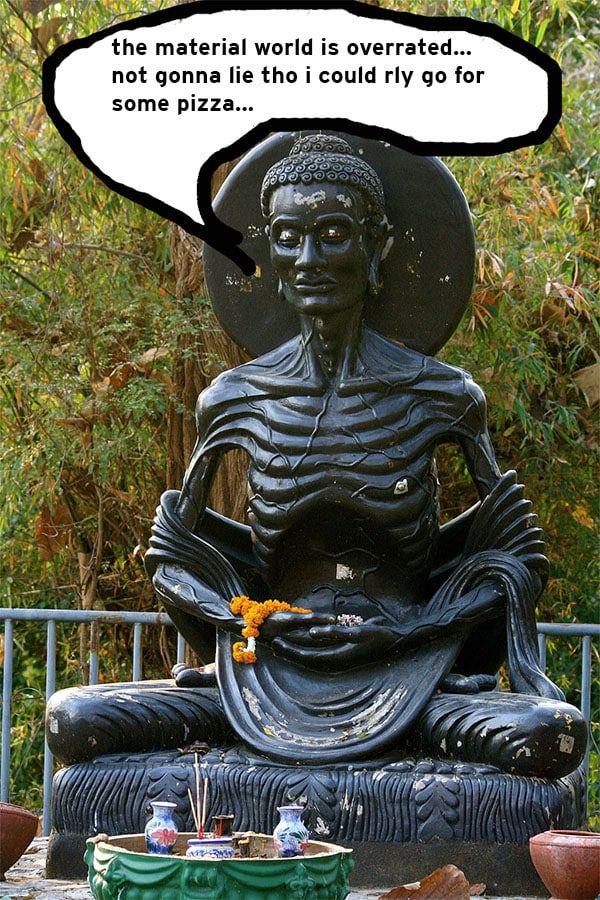
Paradoxically, Nietzsche recognized that this ascetic “turning away” from life was in itself still a form of life-preservation. By renouncing all that is worldly, the ascetic does manage to reduce their suffering, which allows them to cope with the difficulties of existence and persist in spite of their apparent pessimism toward the nature of human life.
Ultimately, though, Nietzsche came to see this approach to existence as life-denying—a symptom of decay and decadence, cultural decline. To permanently turn away from the essential instincts of life—the instincts for growth, forcefulness, expansion, empowerment of all kinds—is, for Nietzsche, a kind of surrender, a sedating “hibernation” that prevents one from truly affirming life and actualizing one’s innate potential.
And yet Nietzsche had a soft spot for asceticism; he saw that the ascetics had almost gotten it right.
At one point in On the Genealogy of Morality, he hints at a form of asceticism whose goal is not life-denial, but rather, a kind of strengthening—the creation of a space in which one can exercise one’s true power:
“So many bridges to independence are shown in the ascetic ideal, that the philosopher cannot refrain from exultation and clapping of hands when he hears the history of all those resolute ones, who on one day uttered a nay to all servitude and went into some desert… What, then, does the ascetic ideal mean in a philosopher? This is my answer—it will have been guessed long ago: when he sees this ideal the philosopher smiles because he sees therein an optimum of the conditions of the highest and boldest intellectuality…”
Here, Nietzsche tells us that true philosophers admire asceticism because turning away from the bustling social world of hedonism and responsibility creates the optimum conditions for philosophizing, for the “highest and boldest intellectuality.” Rather than use asceticism to turn one’s back on life, a true philosopher uses it to get the hell away from everyone else in order to do the most powerful thing they can do: think, practice, and write. In this case, asceticism is not an end in itself, but rather a “bridge” to a more liberated place in which one can do what one is meant to do in the world.
Okay, pause button. You may be wondering: “All right, but what in Eris’ name does this have to do with all that stuff you said in the beginning about escaping hell and living a meaningful life?”
Let’s revisit that note Nietzsche scribbled to himself in 1887 because it’s so damn crucial here:
“I want to make asceticism natural once again: in place of the aim of denial, the aim of strengthening; a gymnastics of the will; abstinence and periods of fasting of all kinds, in the most spiritual realm, too.”
Notice these words: “in place of the aim of denial, the aim of strengthening…”
Do you see?! What Nietzsche’s referring to here is not traditional asceticism. He wasn’t advocating for a path of permanent denial of pleasure or for the total renunciation of the material world. To the contrary, he saw that temporary ascetic experiments could be powerful tools for strengthening, mastering, refining, and deepening our being—bridges to life-affirming habits, liberating discipline, and a good life.
In his book Nietzsche and Zen, Andre van der Braak distinguishes between asceticism and áskēsis—an ancient Greek word meaning “exercise” or “training”—employing the latter word to refer to Nietzsche’s approach to asceticism. Nietzschean áskēsis is about finding a way of life that best suits one’s being, as opposed to finding the “correct” doctrine or belief to live by. It is a way of becoming stronger, more resilient, and healthier in all regards; it is a process of discovering and realizing one’s potential through deliberate training and experimentation.
Contrary to a “will to nothingness,” Nietzsche’s gymnastics of the will is a kind of hammer for forging oneself into a strong and disciplined human. It is a path to attaining the self-mastery necessary to turn away from endless hedonism in favor of pursuing more meaningful goals and dreams and exploring one’s deeper potential. It is a way of breaking insidious patterns of behavior and building the noble habits of mind and body necessary to live a truly good life.
Cool. So how do you do it?
My Experience With Nietzsche’s Gymnastics of the Will
The recipe for undertaking experiments of willpower is pretty simple:
1. You decide on a behavior you want to incorporate or abstain from.
2. You set a firm, immovable intention to follow through with this behavioral change for a significant (ideally specific) amount of time.
3. Optionally, you can incorporate other tools for motivation, repetition, and accountability (e.g. progress charts, an accountability partner, penalties for failure, etc.).
4. You do it.
Years ago, I unknowingly began to pursue a form of Nietzsche’s gymnastics of the will before ever learning of the concept. Gaining inspiration from blogs such as Zen Habits and books I was reading in university, I began undertaking various experiments of willpower and self-expansion.
In the years since then I’ve experimented with physical exercise, dietary changes, meditation, sobriety, heavy reading, nonfiction writing, autodidacticism, drawing, dance, intense socializing, ridiculous stunts in public, traveling abroad, cold-water immersion, minimalism, disciplined frugality, long breaks from TV and video games, spending time in nature, blogging, freestyle rapping, journaling, recording music, entrepreneurship, intensive work regiments, isolation, psychedelic journeying, vegetarianism, dream journaling, abstaining from porn, keeping a clean living space, mindfulness, learning to cook, social media fasts, gratitude exercises, volunteering, acts of kindness, fasting, fiction writing, and extreme self-ownership.
Through these experiments I have gained supernormal levels of discipline, determination, resilience, and self-assuredness. I’ve also gained a number of core habits that have stood the test of time and continue to propel me toward a future I deeply want to live.
With good long-term habits as a foundation I’ve become a successful online entrepreneur; traveled to 21 countries; written hundreds of thousands of words (on things I think are important) that have reached millions of people; released three rap albums and performed live several times; not worked a traditional job in years; volunteered for one of the most life-saving charities in the world; taught English for a year in South Korea; read hundreds of books; gone to dozens of concerts; made thousands of people aware of existential risks and effective altruism; met a few heroes of mine; and helped build a course that nearly 2,000 people are using to build better habits and improve their lives. Above all, and as I said earlier, I wake up almost every day excited to be alive, and I currently feel I’d love to live for thousands of years because there’s so much I want to create and experience.

I swear to you I’m not listing these things to boast (though my ego sure doesn’t mind the proverbial masturbation). I’m spelling these things out to show you the true power of undertaking difficult experiments, cultivating willpower, and building good long-term habits.
Now, I wouldn’t be so foolish as to suggest that anyone could do exactly what I’ve done. I have a unique combination of innate talents and capacities that no one else possesses, as do you. That’s the cool thing about individuality: no one else is quite like you, and there are things that only you can do.
Actualizing secret longings and deep potentialities will probably look a lot different for you than for me. Maybe it will look like starting a family and being the best damn mother of all time. Or becoming a teacher who truly gives a shit and does all they can to help their students. Or building gorgeous rocking chairs and helping little old ladies fix their kitchen cabinets. Or becoming a hilarious stand-up comedian.
The point is that whatever it is you truly want out of this life, good long-term habits are likely the most essential thing you need to get there. In case you’re curious, I currently consider these to be my core indispensable habits:
1. Working regularly on things I care about.
2. Reading and writing.
3. Simple daily exercise.
4. Getting a good night’s sleep.
5. Eating a relatively healthy diet.
6. All substances in moderation.
7. Creating things I’d love to see in the world.
8. Doing useful and/or enjoyable things.
9. A little meditation or mindfulness most days.
10. Making time for loved ones.
11. Noticing ambiguity to stop living reactively.
12. Believing nothing absolutely.
13. Noticing, admiring, and revering the subtle majesty of nature.
If you remember just one thing from this article, remember this:
Good long-term habits are the unsexy building blocks of virtually everything worthwhile in this world.
And how do you build good long-term habits?
It’s helpful to read up on the psychology of habit-formation: there are a lot of cool and highly useful hacks for habit-formation, such as establishing behavioral triggers/reminders, finding an accountability partner, rewarding yourself, keeping a progress chart, creating penalties for failure, pre-commitment bets, public statements of intent, and more. I’ve also found that moving to a new location tends to disrupt one’s routine and creates optimal space in which to establish new routines, patterns, habits.
I’ve utilized most of these tactics, though the best strategy I’ve found for identifying and integrating the habits that really work for me is Nietzsche’s gymnastics of the will: ongoing temporary experiments of willpower to break toxic patterns, stretch and strengthen yourself, and give good habits a chance to take root. This strategy is the overarching macro-structure of my path of habit-formation, whereas the other things I just mentioned are all more like secondary tools.
The 30-Day Challenge: A Profoundly Useful Tool for Life Change
So where am I at with all this these days? Do I have impeccable habits that I uphold under all circumstances?
No, of course not.
I still slip up, sometimes massively. I’m still a work in progress—just like you, just like all of us.
But my core, good habits are, for the most part, well-ingrained at this point. That makes it a lot easier to stay on the right track. The process of sculpting my core behavioral patterns now feels a lot less like hacking off huge chunks of proverbial clay or starting entirely from scratch and more like chiseling out the artful details that will bring the piece to completion.
I’m still utilizing Nietzsche’s gymnastics of the will, except now I’m doing so in a more structured way. Since co-creating 30 Challenges to Enlightenment (which consists of thirty 30-day challenges) and listening to HE co-founder Martijn’s praise of 30-day challenges, I’ve done several such challenges and have found the 30-day structure to be extremely valuable. I’ve also taken advantage of the Map and Forum that come with the course to chart my daily progress, remind myself of my commitments, and connect with the community of users of the course to gain motivation, insight, and accountability.
In the last few months I’ve done a sobriety challenge (High on Existence), exercise challenge (Vitality Builder), living-space-cleaning challenge (Wax On, Wax Off), cold shower challenge (Shaolin Shower), and vegetarianism challenge (a customized version of Hunger Gamer), and every single one of these has proven to be greatly beneficial. I’ll likely do a no-social-media challenge (Stimulation Fast) and meditation challenge (Zen Grasshopper) next.
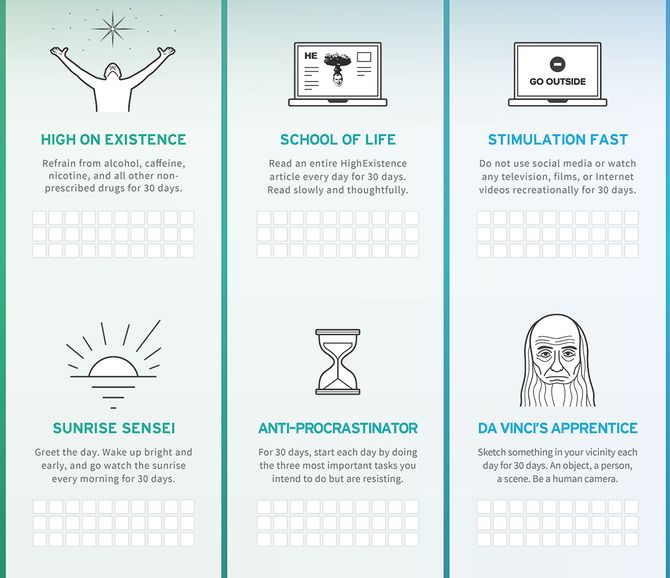
A glimpse of the Enlightenment Map and a few of the challenges within our course.
Why 30-Day Challenges?
I can say in all honesty that all of this has been immensely powerful for me, and I wish I’d had this course years ago. Here’s why:
What 30-day challenges do is disrupt your ingrained patterns, thereby opening up a space in which real, fundamental changes can occur.
They allow you to take a step back, see your behavior in a new light, and gain self-understanding. They allow you to notice the triggers and mind-states that lead you to indulge in sub-optimal behavior and self-sabotaging hedonism. They let you try on new patterns of behavior for a while to find out which habits really resonate with your being and enrich your life. They build the invaluable meta-skill of learning how to set firm intentions and then follow through with your intention—an indispensable skill in accomplishing anything. Jocko Willink likes to say that “discipline equals freedom,” and he’s right. Discipline gives us the power to choose. Without it, we’re slaves to our impulses. With every 30-day challenge, discipline—and therefore freedom—increases.
The 30-day time frame also seems to be ideal (or close to it) for a couple reasons: for one, it’s extremely approachable and manageable. 30 days is not that long, and most people tend to feel like they can do anything for just 30 days. And thankfully, studies have suggested it takes a minimum of just 18 days (or a max of 254 days) to form a new habit. So, after 30 days, there’s a good chance your healthy new behaviors will stick, if you want them to. And if they don’t, but you want them to, you can simply decide to repeat the challenge until they do. I’ve also found that setting a firm intention near the end of a challenge for how one wants to integrate that challenge’s lessons moving forward is a great strategy for ensuring that what one learns during a challenge is carried forward into one’s post-challenge life.
Important Note: In undertaking 30-day challenges or life challenges of any kind, self-compassion is essential. Don’t ever let a challenge become a kind of fascist dictator or guilt-trip machine; challenges are useful tools meant to help you, not make you feel bad. So be gentle with yourself, laugh at your foibles, celebrate your victories, and don’t beat yourself up when you falter.
Musings and Data on 30 Challenges to Enlightenment
So I’ve now given you a pretty thorough overview of my experience with Nietzsche’s gymnastics of the will and 30 Challenges to Enlightenment.
And look, I know what some of you may be thinking: “Man, screw this guy. He drug me through this long-ass article just so he could try to sell me this bullshit course.”
I can honestly say that that’s not my intention here. Sure, I’m promoting our course because I believe it’s a powerful toolkit for life change, but if it doesn’t seem like a good fit for you, that’s absolutely fine. I sure as hell wouldn’t want you to buy something you didn’t truly feel was going to be useful for you.
I wrote this article with the intention of creating something highly valuable in its own right, so don’t dismiss it. Herein I’m giving you an absolutely free, comprehensive, 5,000-word overview of what I understand to be the antidote to the ever-present traps, distractions, and temptations of modern life: experiments of willpower to build strength, discipline, and good long-term habits.
That’s it. Right there. I’m just giving it to you, because I genuinely want as many people as possible to benefit from this information.
But here’s the thing: it’s comparatively quite easy for me to type these words, but it’s a hell of a lot harder for you to implement them. You might feel motivated right now, but after this, who knows? It’s damn easy to move onto the next thing and simply forget about that random dude on HighExistence who was yelling something about habits that one time.
I’ve read hundreds, perhaps thousands, of life-improvement articles over the years, and I know most of them don’t stick. They become another form of addiction—another source of dopamine as you pleasantly imagine how you’re going to change your life but never actually do.
Buying a course, reading the course guidebook, hanging a massive progress chart on your wall, and joining a community of doers is different: it’s a real commitment. Once you go through with it, it’s hard to keep listening to the same old rationalizations for inaction. You feel like you invested in this, so you’re obligated to act.
A nice thing about our course is that we’re not asking you to buy into any dogmatic ideology. There is no official philosophy you need to subscribe to. Mainly there are challenges—experiments that you must do. You act, you learn what you learn, and you do what you will with that knowledge. The process is highly individualized; the course simply provides structure, dogma-free philosophical and spiritual guidance, motivation, community support, and accountability.
Through personal experience I know our course works, but don’t just take my word for it. Check out the heartening results of a recent survey we conducted of active users of the course:
96.2% of users agreed or strongly agreed that the course has improved their lives:
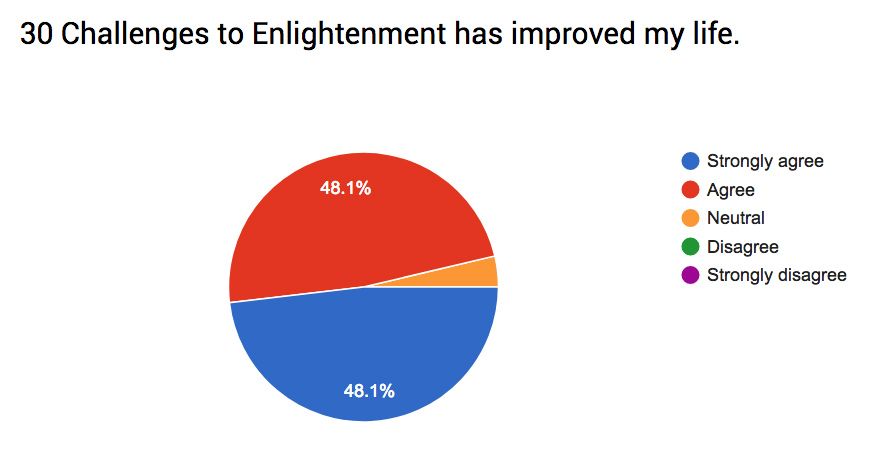
77.8% agreed or strongly agreed that the course has helped them break toxic habits and build better habits:
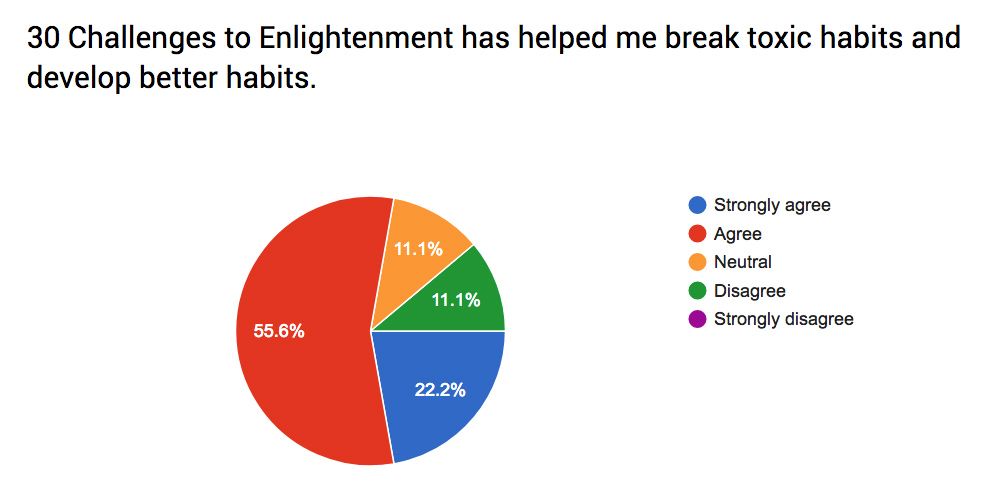
85.1% agreed or strongly agreed that the course has made them more mindful and aware in daily life (a skill indispensable to making beneficial choices regularly):
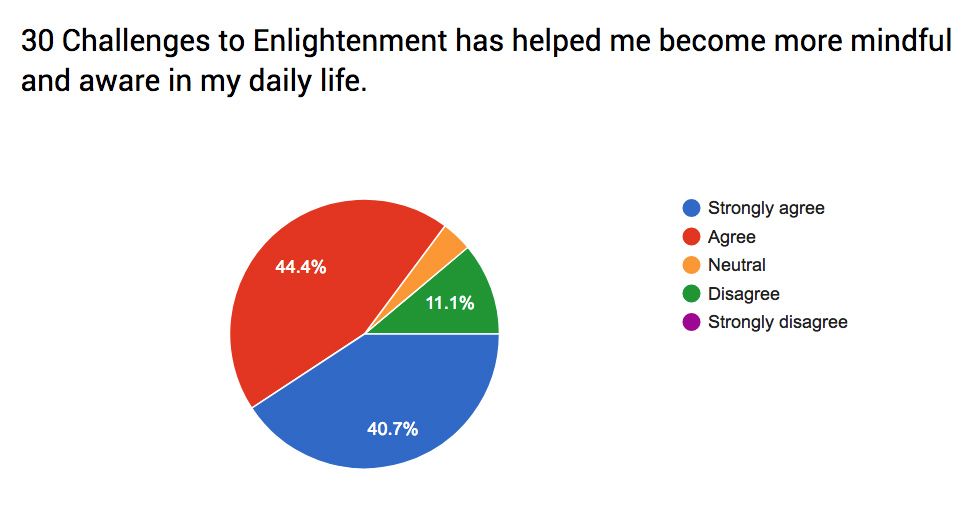
And 96.2% of users agreed or strongly agreed that the course is a life-changing set of tools:
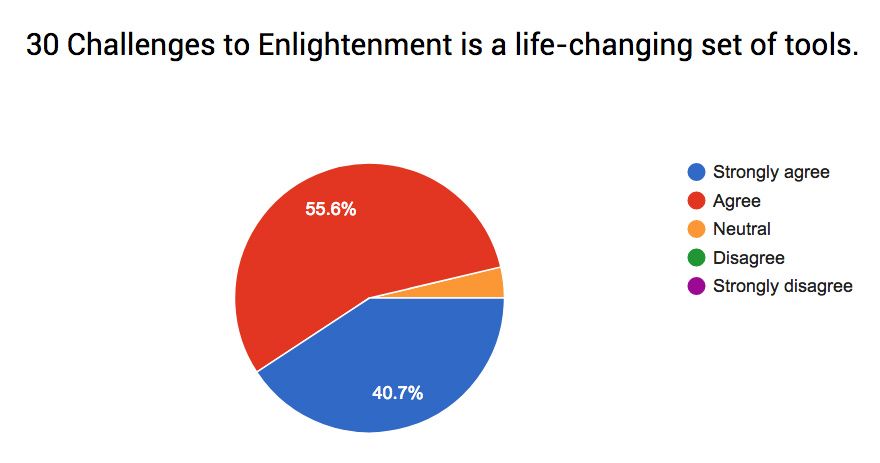
Lastly, here are a few of the many glowing reviews left by the users who completed our survey:
“30 Challenges has opened me a new pathway for me. It sounds cliche but I now look at the future and the world around me differently. This course will bend and morph you in ways you can’t imagine and you will continuously ask for more because of the benefits from this change. I think these results speak for themselves.”
— Joe
“I thought I’m alone with my interest in both science and spirituality. Most folks I know are either on one side or the other. Not only did this course give me some awesome tools for spiritual growth, but most importantly an incredible community of supportive and like-minded people, with whom I can discuss my struggles, observations and meaning of the Universe. I think I finally found my tribe.”
— Maria
“While I’m not even half way done with the course, it has already helped me learn so much about myself, what I’m capable of, and how I can improve myself further for years to come. Here’s to perpetual evolution!”
— Damian
“30 Challenges to Enlightenment is a great course. It helps to explore human possibilities and the own potential in a well structured way. The mixture of easy, intermediate, advanced and very hard challenges shows that one can gradually increase to mastery level of one self. It raises the bar for what can be achieved and thus helps to rise to new heights. It is a key to getting out of the mundane and mediocre into a world of fulfilled and aware living.”
— Andre
At the end of the day, though, you don’t need our course. Ultimately, changing your life is free. Life experiments, 30-day challenges, Nietzsche’s gymnastics of the will—all of these things are free.
The hard part is finding within you the commitment, discipline, motivation, accountability, courage, and follow-through to make it happen. That’s why the structure, motivation, and accountability mechanisms built into our course are quite useful for people, but if you can make this happen on your own, tip o’ the hat and more power to you.
Conclusion
If you’re determined, you can overcome the distractions and temptations of the modern world and build a life worth waking up to each day.
Just remember: It all starts with those fundamental habits. Whatever you’ve got to do, get your core habits straightened out, and everything else will follow.
Let me repeat that one more time:
Get your core habits straightened out, and everything else will follow.
Thanks for reading, and best of luck.
Footnotes:
[1] It’s interesting to note that Nietzsche’s famous “become what you are!” mantra is actually an invocation of a much older quote from the ancient Greek poet Pindar.
Once more, if you’re ready to get serious about building the habits that will serve you well for decades to come, I unreservedly recommend 30 Challenges to Enlightenment.

Jordan Bates
Jordan Bates is a lover of God, father, leadership coach, heart healer, writer, artist, and long-time co-creator of HighExistence. — www.jordanbates.life










